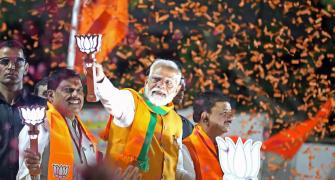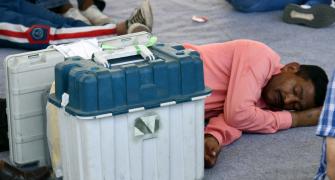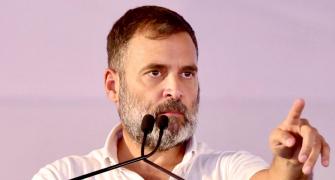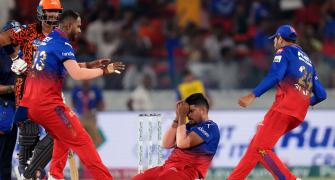'It is understandable if voters in Chhattisgarh are so scared of Naxalite vengeance that two-thirds of them stay away from the polling stations. But that excuse simply does not hold true in a Delhi, a Mumbai, or a Bengaluru -- precisely the three cities whose inhabitants seem to whine loudest on Internet fora,' says T V R Shenoy.
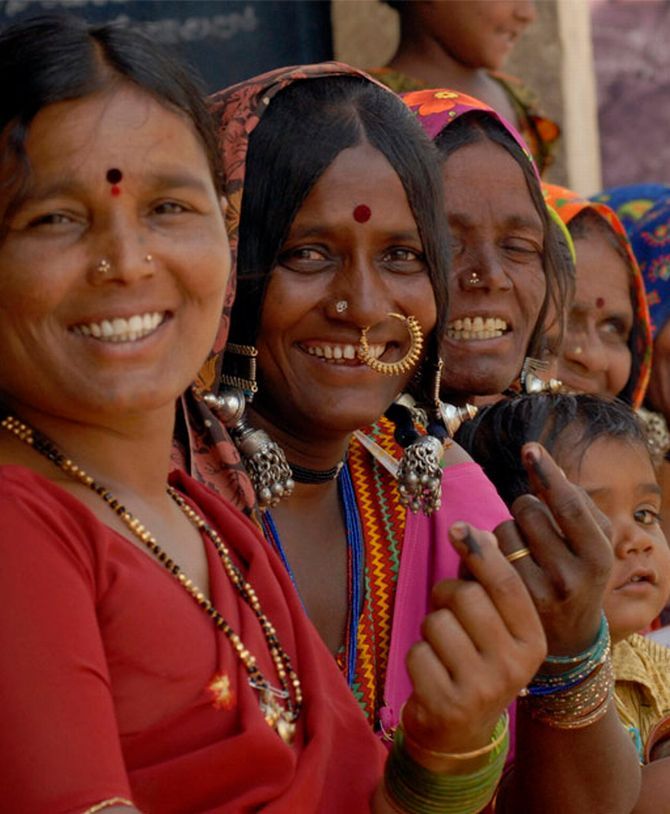 Not a single vote has been cast in Madhya Pradesh, Rajasthan, Delhi, or Mizoram. The electorate in Chhattisgarh has had its say, but the ballots are yet to be tallied.
Not a single vote has been cast in Madhya Pradesh, Rajasthan, Delhi, or Mizoram. The electorate in Chhattisgarh has had its say, but the ballots are yet to be tallied.
With a fortnight to go before counting starts on December 8, there have been two-and-a-half -- possibly three -- clear victors in the current round of polls.
The first winner is participatory democracy itself.
As a rule of thumb, the more people that come out and vote, the healthier the democracy.
Chhattisgarh, which is plagued by the Maoist menace, had to have its Vidhan Sabha elections held on two separate days (unlike the other four states, each of which will vote in their entirety on a single day).
The 18 constituencies that are worst affected went to the polls on November 11, and the second phase was held in 72 seats on November 19.
The final figures are still coming in as I write but the turnout was stunning in the second phase, which covered 80% of the state. It was around 75%, possibly even higher.
To put that into perspective, let us look at the supposedly 'elite' constituencies in India's national capital, its financial capital, and its info-tech capital.
Most of the VVIPs in Delhi live in just two of the seven Lok Sabha constituencies, namely New Delhi and South Delhi. Only 55.71% of the voters came out in the first, and South Delhi was even worse with 47.41%.
Mumbai, presumably on the grounds that it can outdo Delhi in anything, plunged further yet. Mumbai South had a voting percentage of just 40.37%, but even that was outdone by Mumbai South-Central with a truly abysmal 39.51%.
Bengaluru was little better. Bangalore Central's figure was 44.55%, Bangalore South had 44.76%, and Bangalore North offered 46.72%. It says something about the apathy of urban voters that Bangalore's fourth and last constituency, Bangalore Rural, posted a significantly better 57.92%.
To be fair to city-dwellers, the constituencies in Chennai and in Kolkata posted above 60% in every seat -- as did Thiruvananthapuram -- but they were all blown away by the 72.81% in Ernakulam.
But, as a general rule, the greater the degree of (self-proclaimed) 'cosmopolitanism,' the lesser the voter participation.
It is understandable if voters in remote areas of Chhattisgarh are so scared of Naxalite vengeance that two-thirds of them stay away from the polling stations. But that excuse simply does not hold true in a Delhi, a Mumbai, or a Bengaluru -- precisely the three cities whose inhabitants seem to whine loudest on Internet fora.
A complaint heard with wearisome regularity after ever election is that Delhiites, Mumbaikars, and Bangaloreans found their names missing from the electoral lists. But how many of those complainers ever bothered to check with the Election Commission in the first place?
We know that a general election is now fewer than six months away, but have you verified that your name is on the list of voters?
The second triumph is that voters have finally drummed into politicians's skulls that they want to know who their chief executive is going to be should they vote a particular party to power.
It is an empty theory that you vote for a party -- not an individual -- in parliamentary systems.
Take a look at other parliamentary democracies -- Britain, Germany, Canada, Australia, even Israel -- and the principal parties always announce their choice of leader before the election.
Ideally, India should follow the American practice of holding intra-party primaries to choose candidates before the actual elections. There is no need to bring in legislation; any party can choose to do so on its own. But if that is too much to ask, then we should at least who the chief minister or the prime minister is going to be.
Why is this important? Take a look at one of the states going into the polls, namely Madhya Pradesh. Most opinion polls -- for whatever they are worth -- show that Chief Minister Shivraj Singh Chouhan is more popular than his party. Now, try to imagine what the situation would have been in Madhya Pradesh had either Uma Bharti or Babulal Gaur -- both former chief ministers from the BJP -- had been at the helm.
This is a lesson that both the BJP and the Congress needed to learn.
In Delhi the BJP would not say who would lead it against the Congress's Sheila Dikshit. In Madhya Pradesh the Congress returned the favour by refusing to pick its face against Shivraj Singh Chouhan.
Both parties were ultimately forced to retract from this stupid undemocratic stance under public pressure. Dr Harsh Vardhan is now the BJP's chief ministerial candidate in Delhi; Jyotiraditya Scindia is tipped to be the Congress's man in Madhya Pradesh. (Probably too late to create an impact in both cases?)
People vote for the man, not the manifesto. It has taken a long time, but the principal political parties are reluctantly imbibing that lesson.
As I said at the beginning of this column there are two-and-a-half victories, possibly three.
This particular win follows from the second. If you vote for the individual, rather than the party, it follows as a natural corollary that there will be a greater curiosity about the chief executive designate, and consequently greater media focus.
The unwritten law of politics -- and journalism -- was that a politician's private life was his or her own business. That was true of other nations too; in the 1940s reporters didn't mention Franklin Roosevelt's ailments even though the American president was clearly a dying man by the 1944 election, nor did they ever speak of Kennedy's romantic dalliances. Those deliberate omissions would be making the headlines today. And the Indian media follow in the footsteps of the Americans.
Greater scrutiny is a good thing if it allows voters to make a more informed choice. But there is a danger of empty sensationalism chasing away relevant data. It is easy to speak of keeping within the bounds of good taste, but 'taste' varies from one individual to the next. And that is why I am classifying this development as only half a win.
Every democracy proverbially gets the leaders that it deserves. But that is true only if we know whom we are voting for, warts and all. And above all, it depends on voters actually going to vote.



